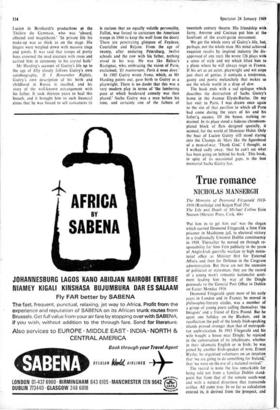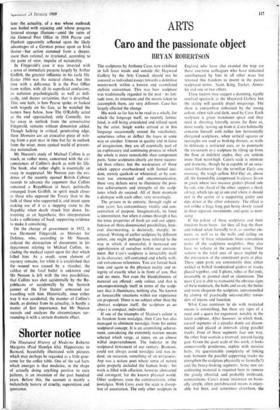The Memoirs of Desmond Fitzgerald 1913- 1916 (Routledge and Kegan
Paul 35s)
True romance
NICHOLAS MANSERGH
The Life and Death of Michael Collins Eoin Neeson (Mercier Press. Cork. 40s) 'Put him in. to get him out' was the slogan which carried Desmond Fitzgerald, a Sinn Fein prisoner in Maidstone jail, to electoral victory in a traditionally Unionist Dublin constituency in 1918. Thereafter he moved on through re- sponsibility for Sinn Fein publicity in the years of Anglo-Irish guerrilla warfare to high minis- terial office as Minister first for External Affairs and then for Defence in the Cosgrave administration. But these are not the memoirs of politician or statesman; they are the record. of a young man's romantic nationalist send- . ment leading him by way of the Dingle peninsula to the General Post Office in Dublin on Easter Monday 1916.
Desmond Fitzgerald spent most of his early years in London and in France; he moved in philosophic-literary circles, was a member of a group of young poets calling themselves 'the Imagists' and a friend of Ezra Pound. But he spent one holiday on the Blaskets, and in recollection the pull of the lonely Irish-speaking islands proved stronger than that of metropoli- tan sophistication. In 1913 Fitzgerald and his wife bought a house near Dingle; he rejoiced in the conversation of its inhabitants, whether in their idiomatic English or in Irish; he was joined by another Irish-speaker of note, Ernest Blythe; he organised volunteers on an intuition that 'we are going to do something for Ireland,' that 'we were on the eve of a national revival.'
The record is none the less remarkable for being told not from a familiar Dublin stand- point but from that of the remote south-west and with a natural directness that transcends artifice. All came true. In so far as calculation entered in, it derived from the Prospect, and later the actuality, of a war whose outbreak was hailed with rejoicing and whose progress fostered strange illusions—amid the ruins of the General Post Office in 1916 Pearse and Plunkett apparently reflected upon the likely advantages of a German prince upon an Irish throne—but action stemmed from a deeper, more than rational, or irrational, according to the point of view, impulse of nationality.
In Fitzgerald's case it was invested with a sense of immediate purpose largely by Arthur Griffith, the greatest influence in his early life. Easter 1916 was the natural climax, but this time with a difference. It is the Post Office from within, with all its superficial confusions, its isolation psychologically as well as mili- tarily, and deeper certainties, that is described. This, one feels, is how Pearse spoke, or looked with tragedy on his face, as he watched the looters busy below, how The O'Rahilly acted as the end approached; only Connolly, too far away in outlook from the conservative Fitzgerald, remains without dimension added. Though lacking in critical, penetrating edge, these Memoirs are an evocative piece of writ- ing from a past near in time but far in outlook from the wiser, more cynical -world of present- day nationalism.
Mr Neeson's study of Michael Collins is as much, or rather more, concerned with the cir- cumstances of Collins's death as with his life. The book, also rather slight,- is essentially an essay in reappraisal. Mr Neeson uses . the evi- dence of the recently opened British Cabinet records to advance the argument that Collins remained a Republican at heart, politically estranged from Griffith, in spirit much closer to those who opposed the Treaty than to the bulk of those who supported it, and intent upon making use of it as a stepping stone to the Republic when death struck him down. In- teresting as an hypothesis, this interpretation lacks a sufficiency of hard, supporting evidence to-make it convincing.
On the change of government in 1932, it was Desmond Fitzgerald, as Minister for Defence, who, according to Mr Neeson, ordered the destruction of documents in his department relating to Michael Collins, in- cluding the medical report upon the shot which killed him. As a result, some element of mystery remains, for while it is established that the .wound was caused by a ricochet, the calibre of the fatal bullet is unknown and Mr .Neeson is left with the two possibilities, that-Collins was shot accidentally by the Re- publicans or accidentally by the Scottish gunner of the Free Staters' armoured car travelling with him. Historically, since either way it was accidental, the manner of Collins's death, as distinct from its actuality, is hardly-a matter of first importance, but Mr Neeson records and analyses the circumstances sur- rounding it with a certain dramatic effect.



































 Previous page
Previous page